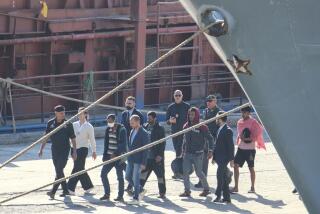UCLA Medical Team Bringing Aid to Refugees in Albania
- Share via
Thuy Tran knows just how scary it is for the thousands of Kosovar refugee children living in tent cities far from home.
Twenty-four years ago this month, she was a 7-year-old Vietnam War refugee, separated from her parents and 12 siblings, living in a camp in the Philippines.
“I remember a lot of confusion and being really hungry,” she said. “That and the feeling of not knowing what was going to happen tomorrow, realizing that nothing would ever be the same as yesterday.”
That is why Tran, now a physician, volunteered to work with a team of UCLA Medical Center health professionals who flew to eastern Europe late Thursday to work at an Albanian refugee camp.
The 30 physicians, nurses and counselors are girding for battle against a wave of summer disease they expect will strike the weary Kosovar refugees.
“The great fear is that, with the miserable sanitation and bad water supply these camps have, we’ll start to have destructive epidemics in the area” that will claim lives as savagely as the Serbian army, said David Langness, a UCLA Medical School administrator.
Langness, who helped organize the trip, flew last week to Albania to survey the camp in the capital city of Tirana where the UCLA team will work.
“There’s this large concrete swimming pool that has been drained” and is used as a urinal by camp refugees and as a playground by some children, he said. “You knew disease could not be far behind.”
Such potentially fatal illnesses as cholera and tuberculosis are likely to flourish in the heat and humidity that is descending on the more than 200,000 refugees in Tirana, said Dr. Neal Parker, a UCLA Medical School dean.
Parker is one of 15 physicians who flew out Thursday. A second group is scheduled to embark on the 15-hour flight for Albania on Wednesday, said British Airways officials. The airline donated free passage to the UCLA doctors and carried 1,200 pounds of donated medicine and surgical supplies.
With antibiotics, ointments and diagnostic instruments collected from area hospitals and equipment manufacturers, the two teams will treat camp residents in alternating eight-day shifts until June 6, Parker said.
Besides illnesses brought on by unsanitary camp conditions, the team expects the normal range of maladies found any large population, Parker said.
“There will be a lot of folks with diabetes and heart conditions,” he said, who left their medication behind in a frantic rush to get out of Kosovo.
Janine Shelby, a clinical director of the UCLA Rape Treatment Center, expects to treat women abused in the conflict.
A veteran counselor familiar with the horrors inflicted on women in Bosnia, Shelby hopes to help bolster limited help in the camps for Kosovo rape victims.
Rape counseling “is a relatively new effort” in the refugee camps, she said, and counselors will need to overcome barriers.
“In their culture, sexual assault is a very private thing,” she said. “Outwardly dealing with the negative emotions that come from the experience,” like an American woman in counseling might, “is not appropriate to them.”
Ten-year-old William Evangelatos, whose father, Dennis, is a UCLA doctor on the team, worried about another group of refugees.
While he watched his father pack for his trip, the Westwood third-grader piled some of his favorite stuffed animals, Frisbees and toy cars into the suitcase.
“If I were in their position I’d want more toys,” he said. “Some of them don’t have any families. I think that it’s pretty sad.”
His advice to his father: Don’t get sick.
Given the camp conditions and shortage of doctors, the worry is real, said Nancy Aossey, president of the International Medical Corps agency in West Los Angeles. The agency has sponsored more than 220 health care workers from the United States who are working in refugee camps.
Because of the overwhelming number of refugees, she said, doctors are working 18-hour days, seven days a week. As a result, she said, “they’re seeing a lot of psychological trauma, and it’s starting to get to them.”
“These doctors will be providing a welcome break for our workers over there,” said Aossey.
More to Read
Sign up for Essential California
The most important California stories and recommendations in your inbox every morning.
You may occasionally receive promotional content from the Los Angeles Times.













